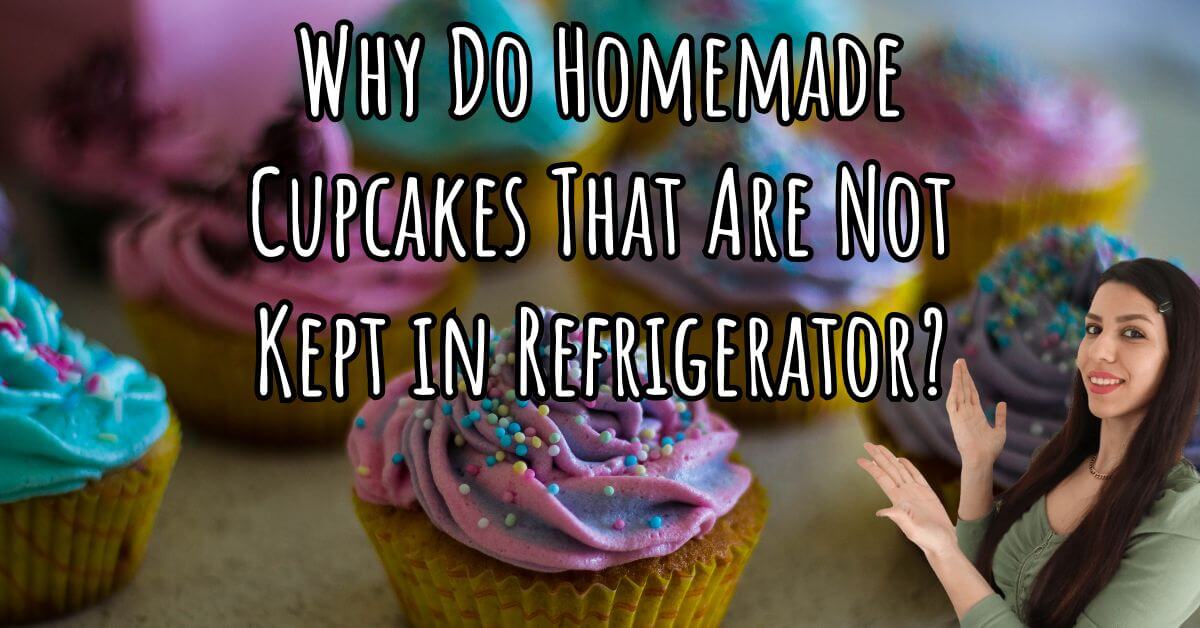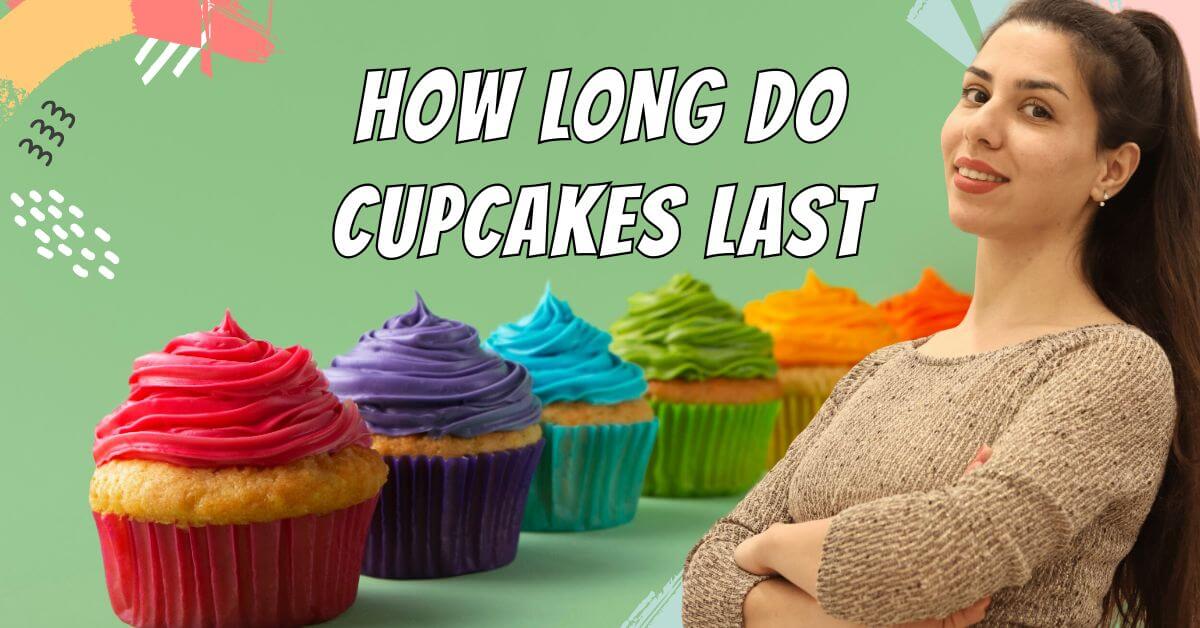Why Do Homemade Cupcakes That Are Not Kept in Refrigerator

Hey everyone, I’m Zahra here. I love making vegan cupcakes; they’re so quick and easy! To be honest, for me rarely have cupcakes left over, because my family always waits with their forks swoops in and devours them as soon as they cool.
But a few times when I’ve hosted friends, I’ve had to bake the cupcakes beforehand. I researched how to keep them fresh, and I’m happy to share my tips with you.
Here’s the most important thing to know: Don’t store homemade cupcakes in the fridge! The fridge will dry them out and make them stale. Instead, store them at room temperature in an airtight container. They’ll stay fresh for up to 2 days this way.
If you live in a hot climate, you can only keep the cupcakes at room temperature for a day. And if you use dairy products like custard in your cupcakes, you should serve them immediately after baking, because these ingredients can spoil quickly.
In this article you will read:
The Refrigerator’s Drying Effect on Cupcakes
You may have heard that refrigeration can dry out cupcakes, and that’s absolutely true. The refrigerator’s cold and dry environment can cause moisture to evaporate from the cupcakes, leaving them dry and stale. The crystallization of sugar and flour is accelerated in the fridge, leading to a less desirable texture and taste. That’s why it’s best to avoid refrigerating homemade cupcakes.

Instructions for Storing Cupcakes at Room Temperature
If you want to keep homemade cupcakes at room temperature for a few hours, Here’s a step-by-step guide on how to store cupcakes without refrigeration:
Step 1: Allow the Cupcakes to Cool Completely
After taking your cupcakes out of the oven, let them cool completely on a wire rack. This allows the heat to dissipate and prevents moisture buildup inside the container.
Step 2: Choose an Airtight Container
Select an airtight container large enough to hold all the cupcakes without touching each other. This will prevent moisture loss and protect the cupcakes from outside air, which can cause them to dry out quickly.
Step 3: Store the Cupcakes in the Airtight Container
Place the cooled cupcakes gently into the airtight container, ensuring no damage to the frosting or toppings. Close the container tightly and prevent any air from entering.
Step 4: Find the Perfect Spot
Store the container of cupcakes in a cool, dry place away from direct sunlight. Avoid areas with high humidity, as it can promote mold growth and spoil the cupcakes faster.
Tips for Preventing Mold Growth and Disposing of Moldy Cupcakes
Mold growth is typical when storing cupcakes, especially in humid environments. Here are some tips to prevent mold growth and what to do if you encounter moldy cupcakes:
- Allow the cupcakes to cool completely before storing them to prevent moisture buildup.
- Whether you’re vegan or not, using vegan ingredients in your cupcakes is important, as dairy products and eggs can encourage mold growth.
- Keep the cupcakes in an airtight container to minimize exposure to moisture and prevent mold growth.
- Store cupcakes in a cool, dry place: Avoid storing cupcakes in hot or humid environments, as this will also encourage mold growth.
- If you’re not going to eat the cupcakes within 2 days, you can freeze them. To do this, Wrap them individually in plastic wrap and place them in an airtight container before storing them in the freezer.and freeze for up to 3 months. Thaw the cupcakes overnight in the refrigerator before serving.
- Use dairy-free frosting; dairy-free frostings are less likely to encourage mold growth than dairy-based frostings.
- Using healthy oils, such as coconut oil, can help keep your cupcakes moist and prevent them from stale.
- Avoid exposing the cupcakes to extreme temperatures or direct sunlight, as it can affect their texture and taste.
By following these tips, you can help prevent mold growth on your cupcakes and enjoy them for longer.
Remember, Check the cupcakes regularly for any signs of mold. If you spot mold, it’s important to dispose of the cupcakes immediately.
The Durability and Health Benefits of Vegan Cupcakes
I’ve discovered that by substituting traditional ingredients with plant-based alternatives, vegan cupcakes can stay fresh for longer periods and offer a healthier option for indulging in sweet treats.
Dairy-Free Frostings
One of the reasons vegan cupcakes stay fresh is the absence of dairy-based frostings. Dairy products like cream cheese or whipped cream have a shorter shelf life and require refrigeration. Vegan frostings, on the other hand, often use plant-based ingredients like coconut milk or almond milk, which do not spoil as quickly and can be safely stored at room temperature.
Egg Replacements
Eggs are another ingredient that can contribute to spoilage in cupcakes. In vegan baking, eggs are commonly replaced with alternatives like chia seeds or flaxseeds mixed with water. These replacements provide moisture and binding properties without the risk of spoilage associated with eggs.
Healthier Oil Options
You can use healthier oil options like coconut oil as a substitute. Coconut oil not only adds a delicious flavor to the cupcakes but also offers various health benefits, including antimicrobial properties and healthy fats.
Can Vegan Cupcakes Be Refrigerated?
I get asked this question all the time. The answer is Yes, vegan cupcakes can be refrigerated; if you’re going to eat them within a few days, you can store them at room temperature in an airtight container. But if you’re not going to eat them right away, or if you live in a hot climate, the fridge is a good option. Just be sure to let them come to room temperature before serving so they don’t taste too cold.
Conclusion
In conclusion, homemade cupcakes can stay fresh and moist for up to two days but spoil quickly if you don’t store them properly. Here are the reasons:
- Moisture: Cupcakes are made with a variety of ingredients that contain moisture, such as eggs, milk, and butter. When these ingredients are exposed to air, they start to evaporate. This can make the cupcakes dry out and crumbly.
- Heat: The heat can cause them to go stale and develop mold.
- Bacteria: Cupcakes can also become contaminated with bacteria if not stored properly. Especially if it contains dairy products or eggs because these are perishable materials.
So, how can you keep your homemade cupcakes fresh?
- Store them in an airtight container: This will help to lock in the moisture and prevent the cupcakes from drying out.
Let them cool completely before storing them. - Don’t store them in direct sunlight or heat.
- Rotate the cupcakes in the container so that all of them are exposed to the same amount of air.
- Don’t stack the cupcakes on top of each other, as this can crush them. Instead, place them in a single layer in an airtight container.
By following these tips, you can enjoy your homemade cupcakes for longer.
Here are some additional things to keep in mind:
Cupcakes with dairy products or eggs should be consumed fresh.
Mold spores are everywhere. They need warmth, moisture, and food. If you leave your cupcakes out at room temperature, you provide them with moisture and food in a warm setting. Spores will begin germinating within hours, and within days, they will have established colonies of mold on your moist, sugar-rich cupcakes.
- If you see mold on your cupcakes, don’t eat them! mold can harm your health.
- If you’re unsure how long your cupcakes have been out at room temperature, throwing them away is best. It’s better to be safe than sorry!
I hope this article has been helpful! If you have any other questions, please feel free to ask me below.


